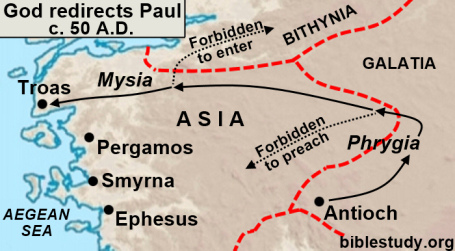by Jeff Asher

The history of the church at Troas is sketchy. Very little is known except what we read in Acts 20:7-12. Evidently Paul established this congregation near the end of his third preaching journey (2 Cor. 2:12). At some point they had an evangelist who worked with them by the name of Carpus to whom Paul had loaned some books (2 Tim. 4:13).
While little is known about their history, Acts 20:7-12 reveals a lot about their enthusiasm and zeal for the worship of Jesus. They are a positive example of a proper attitude toward the worship of the saints for all Christians in all times.
Assembly For Worship
The Christians at Troas assembled every first day of the week to eat the Lord’s Supper and engage in other acts of worship (Acts 20:7). Luke observes, “the first day of the week when the disciples came together” indicating it was their habit to do so. The fact that Paul remained in Troas for seven days further proves that this was the usual day when Christians met (cf. Acts 20:16).
We need to develop the habit of assembling with the saints (Heb. 10:25). Sunday is the “Lord’s Day” (Rev. 1:10). It is the only day in the week to which we can attach any significance concerning Christ. It is the day of His resurrection (Luke 24:1, 13, 21). It is the day upon which He appeared alive to His disciples (John 20:1, 11; Luke 24:30-43). The gospel was first preached on Sunday (Acts 2:1, 14). The first baptism was performed on that day (Acts 2:41). It is the day of the week upon which the church came into existence (Acts 2:47). The worship of the saints upon this day of the week should inspire their hearts with love for Jesus, confidence in their salvation and zeal for the souls of men.
Do you have this habit of assembling with the saints?
They Ate The Lord’s Supper In An Assembly
They “came together” to eat the Supper. These saints did not regard the Supper as a private devotion. Neither did they care so little for it that they carried it with them wherever they went like a sack lunch. Furthermore, Paul’s determination to remain in Troas is proof this is the arrangement the Lord desires for the His Supper. The apostle could have eaten on the road, by himself or with those of his company. However, he chose to eat with disciples in their assemblies (cf. Acts 21:4).
They came together to break bread in order to preach Christ’s death (1 Cor. 11:26). The Christians at Troas understood the importance of the memorial feast. They could see in it a perpetual reminder of the promise of Christ’s return and the assurance of their own resurrection by virtue of His atoning death and triumphant resurrection from the grave. This message of hope had to be shared. They were truly “one bread” and “one cup,” even as they were one body (1 Cor. 10:16-17). Assembled together they could all eat that bread and drink that cup in remembrance of Christ (1 Cor. 11:27-28).
Do you discern the Lord’s body and show his death with the saints when they come together?
They Didn’t Complain About The Time Involved
Luke says Paul was “long preaching” (Acts 20:9), and that he did not quit even at midnight (20:7). I grant that there are some special circumstances in this situation at Troas. Paul probably had established the church just months earlier on his way into Macedonia (2 Cor. 2:12). He was anxious to visit the church and see how they were doing (cf. Acts 15:36). Naturally, there would be things that he would want to say to these special people. This would justify a longer sermon than usual. However, just because Paul came to town their daily responsibilities did not disappear. They still had work to do the next day, children to care for and responsibilities at home. All of this and even more, yet they still managed to work in an all night session to hear Paul preach (Acts 20:11). How unlike some brethren they are. Today many are continually looking for ways to shorten the assembly. In some churches it is worship “by the numbers.” We have to start “on time” and quit “on time.” We can sing only two songs and not all the verses because we don’t want to “go over.” Preachers are being forced to confine their sermons to 15 minutes. A twenty-five minute sermon is “long preaching” for some. God forbid that we should have a baptism.
We are living in troublesome times when the value of a sermon is determined by its length. Some folks are chaffing under long preaching because it is poorly prepared and delivered. However, others have a heart and mind somewhere else. They like them short because there is nothing in them. Do you have the Trojan spirit concerning worship?
.
With thanks to David Padfield of the Church of Christ in Zion, Illinois